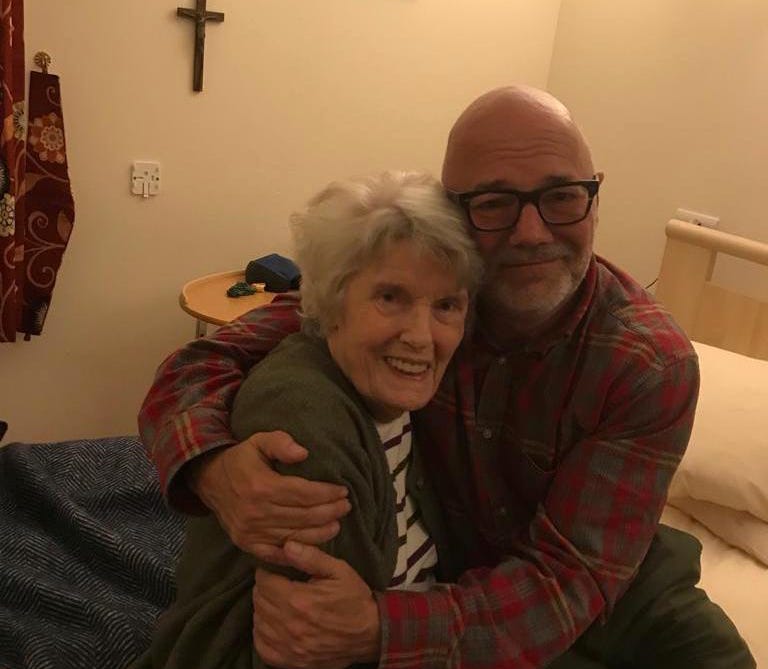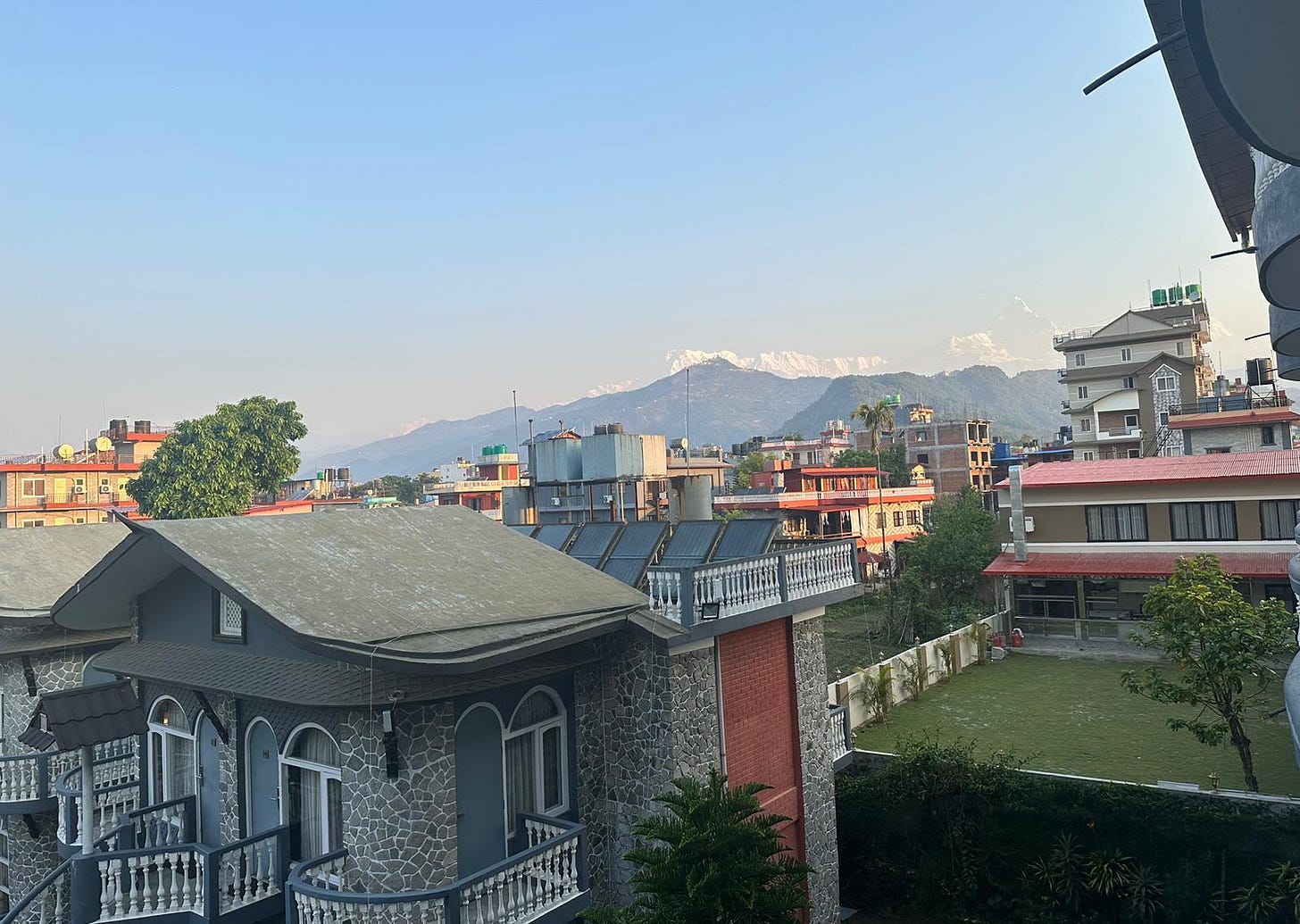America's Leaders In The Twilight Zone
Time for the over-80s to make way for the next generation.

I have seen the future and I do not want it. It’s a sunlit vista of the over-80s — too healthy to die, too old to fully live. They are the experiential bookend to all those “deaths of despair” among the young and middle-aged that plague America in the era of the poppy, the reason our life expectancy isn’t in free fall. Pharmaceuticals — miraculous, ever-improving, ever-more innovative — make it all possible, and the result is a healthier life in our prime but, as we age, an endless, crepuscular twilight zone of the undead.
Maybe it’s visiting my 87-year-old mother in the nursing home she finally had to resort to, but the ravages of old age, once ended by death in your seventies or earlier, terrify me. You walk past room after room and see the empty stares into space, the slumped husks of bodies propped up in bed, and the frail wanderers who know neither who they are nor where they are going. I try to imagine my dad there, and simply cannot. He was far too active, headstrong and independent to allow himself to be reduced to this. His sudden death, however dreadful, nonetheless spared him. It’s the one consolation.
And my own mother, with whom I have been closer than anyone on earth, whose intense, abiding love has long been a still, white-hot thread connecting every part of my own life, is now drifting away in her final home, dementia gradually robbing her of memory, and of coherence. She seems happier, actually, than I can ever remember her, which isn’t saying a huge amount, but it’s definitely better than the agonies she once endured with bipolar disorder. But how do I really know?
An ocean away, I find it almost impossible to talk to her on the phone anymore, because it rips me up, as she resorts to repeated pleasantries because she can no longer muster much else. I can’t get through anymore — to the essence of her. I can’t engage like I did. And a mere series of “love you”s somehow seems to betray the honesty and sharpness of our relationship. When I’m there, in her room, our bodies can comfort each other; so far away, the grief just kind of swallows me up.
With my mother, the deterioration was quite rapid, with only a few harbingers. “I just can’t remember the words, anymore, darling. They just won’t come,” she told me a few months ago, as I reassured her everything was fine. Now, she can forget my brother’s name for a few seconds. And this kind of sudden crumble of the faculties is not unusual. In the netherworld of the physically still fine but seriously old, the slope is sometimes very slippery. And the person suddenly sliding may not be the first to know.
There are, of course, many happier stories of seniors having a great time of it in their seventies and beyond. My dad, for example, was living his best life — playing golf, watching rugby, painting watercolors, hanging with his grandkids, glued to his iPad — when it was suddenly over. He lived in the spirit of the British magazine, The Oldie — one of the best around, full of curmudgeonly wit and blasts of brutal honesty. My favorite feature — I’m not sure if it’s still going — was a recurring profile feature about people you assumed had died, but were actually still alive. It was called “Still With Us.” If all else fails, laugh.
There’s a balance, in other words, between resisting decline and accepting it and enjoying what’s left. But this balance seems to get very skewed by power. Here, for example, is a recent description of Senator Dianne Feinstein: “on her most difficult days, she does not seem to recognize even longtime colleagues.” Feinstein has been absent from the Senate for a while now with shingles and refuses to quit, even as her party’s judicial nominees linger. She’s older, at 89, than my mum. She’ll allow a temporary replacement — but good luck getting the GOP to sign off on that.
Chuck Grassley is also 89 and just won his eighth term in the Senate. Does he think he’s Methuselah? Bernie Sanders is 81, and there’s some buzz that he might run in 2024 if Biden doesn’t. Then we have Senate Minority Leader Mitch McConnell, 81, who just had his second fall, like many other octogenarians, and has also been out for a month. Feinstein has been in the Senate for over three decades. McConnell has had his Kentucky seat even longer, since 1985.
Thirty-four senators are now 70 or older — well past retirement age in all advanced countries. It’s the second-oldest Senate since 1789. It’s not a flaw to admit your age and quit after a good innings, with your faculties still intact. Even the last Pope did it. Nancy Pelosi resisted forever, but finally put down her gavel at the age of 82, saying, “For me the hour has come for a new generation to lead the Democratic caucus that I so deeply respect.” Not so hard, eh?
You can probably guess what’s coming. It is a mark of total dysfunction that a young country will probably be forced to pick between two octogenarians for president next time around (Trump would hit 80 during his second year in office). The oldest age of a president before Biden was Reagan — 77 when he left office. A recent poll found that 68 percent of registered voters — and almost half of Democrats — feel that Biden is “too old for another term.” A poll in September found that 73 percent of Americans want an age limit for public office. The most favored limit? 70. (That was the same age as Ben Franklin when he signed the Declaration of Independence — the oldest of the 56 signatories, whose average age was just 44.) Seems right to me.
Biden’s sprightliness amazes me; as does Trump’s deranged energy. For men their age, they’re remarkable. But they’re both well past their best. Any current video of Trump and Biden contrasts sharply with even their recent past. And this is perfectly natural! And what are they trying to prove by never quitting? They’ve both been president, and can claim legacies of different kinds. So quit proudly, and don’t leave us like Logan Roy. It is not weakness to accept being human. It’s strength. Sure, we’ve extended life. But we haven’t extended living — as most of us understand it.
Both Trump and Biden should withdraw from the race, and let younger politicians in both parties figure a way forward. Will they? I doubt it. Trump won’t because his ego won’t allow it. Biden probably won’t because he fears Trump could beat other Dems. But Biden should follow the path of Anthony Kennedy and retire while he can still pick a successor who isn’t his vice president, who’d inherit in the case of sudden death or incapacity. He needs to avoid the Ruth Bader Ginsburg trap and suddenly leave the Dems with Kamala Harris against Trump. No one could blame Biden for deciding on a one-term legacy this summer.
He’s given a lifetime of service to this country. A final service? Take a deep breath and leave the stage. You’ll be glad you did.
Re-Booting Social Media
I’ve refrained from getting involved in all the Twitter — and Twitter Files — brouhaha, largely because I find it pretty boring and insular. At core, I’m with Matt Taibbi — and his post here seems a fair-minded summary of what he’s been through with Elon Musk on the one hand and the woke hordes on the other. I wasn’t fond of the old Twitter — the stultifying invisible hand of social justice tipping the scales systematically. But the new Twitter — effectively a platform built for a fickle, moody tyrant — was just as bad. The two models — left condescension and right madness — reflect our more general political and cultural choices, which means to say a culture in which the to-and-fro of reason has been replaced by mobs, insults, witch-hunts and obscenities.
In my view, Substack helped break this cycle by providing a platform where those of us who felt alienated by both right and left media could write freely again. Almost three years in, it’s been wonderful to revive the Dish community — a huge, continuing success. Having you back in the mix correcting, admonishing, amplifying and contributing has helped me as a writer, and the pace is much more sustainable than hourly blogging.
My Twitter self was my worst self. The immediacy was good for dopamine, terrible for judgment. How I came across on Twitter was vastly different than the way I actually am here and on the Dishcast. So the arrival of Substack’s new Notes feature is a challenge for me and our media culture. It replicates Twitter, but strives to restore the civility of the old blogging days, when we fought furiously but without the invective that came to define the hit-and-run Twitter slugfest. In the words of Hamish McKenzie, one of the Substack pioneers I’ve come to know and trust:
Goals: help writers find readers; help readers find writers; make more beauty happen; castrate the culture wars.
All of which is to say that @sullydish will no longer tweet a thing, and all my short-form thoughts and moods from now on will be on the Notes site here (or the “Notes” tab in the Substack app), and connected to my longer writing at The Weekly Dish. After this newsletter goes out today, I’ll invite all of you to follow me there, in the hopes that a saner, calmer social media can help rebuild the atrophied muscles of liberal democratic debate.
The one thing more important than defending liberal democracy in these polarized times is practicing it. That’s what we’re doing here on the Dish. It’s what I failed to do on Twitter. And it’s what Chris and I hope to do at Notes. Join us there — and if you want to support our venture more substantively, subscribe!
New On The Dishcast: Robert Kaplan
Bob is a foreign affairs and travel journalist, and a scholar of the classics. For three decades he reported for The Atlantic and wrote for many other publications, including the editorial pages of the NYT and WaPo — and TNR back in my day. He holds the Robert Strausz-Hupé Chair in Geopolitics at the Foreign Policy Research Institute and is a senior adviser at Eurasia Group. He’s the author of 21 books, including The Coming Anarchy, Balkan Ghosts and Asia’s Cauldron. His new book is The Tragic Mind, which we discuss at length.
Listen to the episode here. There you can find two clips of our convo — why anarchy is worse than tyranny, specifically in Iraq, and the question of whether Taiwan is worth going to war over. That link also takes you to listener comments on our recent episodes with Michael Lind and Jon Ward. We also added more reader reflections to the Dish thread, “Boomers In The Twilight Zone” — on aging and assisted suicide. They’re as moving and insightful as ever. Have a look.
Browse the Dishcast archive for another discussion you might enjoy (the first 102 episodes are free in their entirety). Upcoming guests include Mark Lilla on liberalism, Susan Neiman on how “left is not woke,” Tabia Lee on her firing as a DEI director, Chris Stirewalt on Fox News, Nigel Biggar on colonialism, and John Oberg on veganism (recorded already but I’m sampling a variety of plant-based meats to comment on when the episode is released). As always, please send your guest recs and listener feedback to dish@andrewsullivan.com.
Dissent Of The Week: What’s A “Real” Trans Kid?
A reader goes another round with me:
While I’m always immensely grateful to be deemed worthy of a response, that last one was a bit of a non sequitur. After you wrote that you wouldn’t ban sex changes for children, I asked simply, “On what basis do you propose to decide that, yes, this particular kid should have a sex change?” I gotta fisk your response (reproduced below in italics):
I want to retain the option for those cases where it might seem essential to a child’s survival and sanity.
But there is no diagnostic protocol (including any form of psychological evaluation) that has been shown (however weakly) to be able to pick out these “essential” cases. It’s all pure guesswork. Given that, the principle of “first, do no harm” must apply here.
Read the rest of that fisking, along with my response to it and another dissent, here — for paid subscribers.
Mental Health Break
I love this man:
Previous Dish on Lil Nas X — “The Triumphs Of Gay Black Men” — here.
In The ‘Stacks
This is a feature in the paid version of the Dish spotlighting about 20 of our favorite pieces from other Substackers every week. This week’s selection covers subjects such as the six-week abortion ban in Florida, the new trans restrictions in Missouri, and the debate over NPR and the BBC as “state media.” Below are a few examples, followed by a new Substacker:
Were the Tennessee lawmakers expelled because of racism? Not by any stretch.
Radley Balko reviews the record of Garrett Foster, whose murderer might go free because of Gov. Abbott. His proposed pardon is monstrous.
Lee Fang just quit The Intercept — welcome!
You can also browse all the substacks we follow and read on a regular basis here — a combination of our favorite writers and new ones we’re checking out. It’s a blogroll of sorts. If you have any recommendations for “In the ‘Stacks,” especially ones from emerging writers, please let us know: dish@andrewsullivan.com.
Money Quotes For The Week
Read seven of them here — from Biden, MLK, Roy Cohn, Ross Douthat, Scott Yenor, Leor Sapir and Andy Kelly.
Yglesias Award Nominees
Read two of them here — from Jonah Goldberg and Parker Molloy.
Poseur Alerts
Read two of them here — from Richard Land and Madeleine Aggeler.
The View From Your Window Contest
Where do you think it’s located? Email your guess to contest@andrewsullivan.com. Please put the location — city and/or state first, then country — in the subject line. Proximity counts if no one gets the exact spot. Bonus points for fun facts and stories. The deadline for entries is Wednesday night at midnight (PST). The winner gets the choice of a VFYW book or two annual Dish subscriptions. If you are not a subscriber, please indicate that status in your entry and we will give you a free month subscription if we select your entry for the contest results (example here if you’re new to the contest). Happy sleuthing!
The results for this week’s window are coming in a separate email to paid subscribers later today. It’s an especially challenging one, but below is a sneak peek from the weekly chef and his sampling of the weekly mixologist’s latest creation:
To answer the question on everybody’s lips: no, we did not have Rocky Mountain Oysters for dinner. First, apart from the name, they don’t have anything to do with the Rocky Mountains. Second, they are testicles.
I don’t have much to say about Colorado cuisine. There is Colorado Green Chili, which is the same as New Mexico Green Chili. There is the Denver Omelet, which has many origin stories, one of which is that its name comes from Denver City, Utah, where Chinese cooks invented the Denver Sandwich by slathering Egg Foo Young between two pieces of bread for the miners. Basically the Denver Omelet is what you get if you go to the omelet counter in a Marriott Courtyard and ask for an omelet with ham, peppers, onion, and cheese.
Instead we took a break from VFYW meals and cooked Roasted Black Cod in Ginger Cilantro Broth. And, of course, we made the latest cocktail, “Amarena Bella” — superb, and my favorite so far. (Like the Austin mixologist, I am suffering from an overstocked bar at the moment, so I was glad to make a cocktail for which I had all the ingredients.) My wife cooked a pear-and-almond tart for dessert.
Thanks as always for a great contest. This one was a doozy.
See you next Friday.







